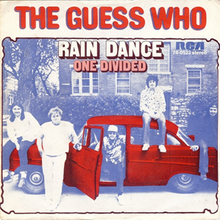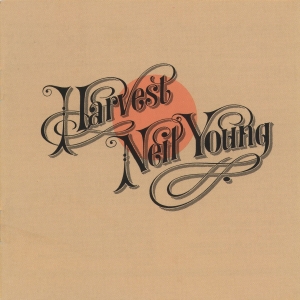
Harvest is the fourth studio album by Canadian-American musician Neil Young, released on February 1, 1972, by Reprise Records, catalogue number MS 2032. It featured the London Symphony Orchestra on two tracks and vocals by guests David Crosby, Graham Nash, Linda Ronstadt, Stephen Stills, and James Taylor. It topped the Billboard 200 album chart for two weeks, and spawned two hit singles, "Old Man", which peaked at No. 31 on the US Billboard Hot 100, and "Heart of Gold", which reached No. 1. It was the best-selling album of 1972 in the United States.
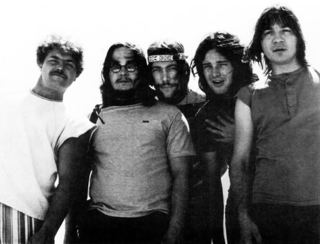
The Guess Who are a Canadian rock band formed in Winnipeg, Manitoba in 1965. The band found their greatest success in the late 1960s and early 1970s, under the leadership of singer/keyboardist Burton Cummings and guitarist Randy Bachman, with hit songs including "American Woman", "These Eyes", and "No Time".

"When Doves Cry" is a song by American musician Prince, and the lead single from his sixth studio album Purple Rain. According to the DVD commentary of the film Purple Rain (1984), Prince was asked by director Albert Magnoli to write a song to match the theme of a particular segment of the film that involved intermingled parental difficulties and a love affair. The next morning, Prince had composed two songs, one of which was "When Doves Cry". According to Prince's biographer Per Nilsen, the song was inspired by his relationship with Vanity 6 member Susan Moonsie.
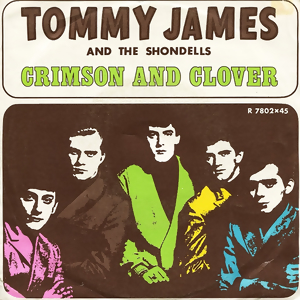
"Crimson and Clover" is a 1968 song by American rock band Tommy James and the Shondells. Written by the duo of Tommy James and drummer Peter Lucia Jr., it was intended as a change in direction of the group's sound and composition.

"Family Affair" is a 1971 number-one hit single recorded by Sly and the Family Stone for the Epic Records label. Their first new material since the double A-sided single "Thank You "/ "Everybody Is a Star" nearly two years prior, "Family Affair" became the third and final number-one pop single for the band. In 2021, Rolling Stone magazine ranked the song 57th on their list of the 500 Greatest Songs of All Time. The cover version by John Legend, Joss Stone, and Van Hunt, won the Grammy Award for Best R&B Performance by a Duo or Group with Vocals at 49th Annual Grammy Awards.

Kurt Frank Winter was a Canadian guitarist and songwriter, best known as a member of The Guess Who.

"Last Dance" is a song by American singer Donna Summer from the soundtrack album to the 1978 film Thank God It's Friday. It was written by Paul Jabara, co-produced by Summer's regular collaborator Giorgio Moroder and Pete Bellotte, and mixed by Grammy Award-winning producer Stephen Short, whose backing vocals are featured in the song.
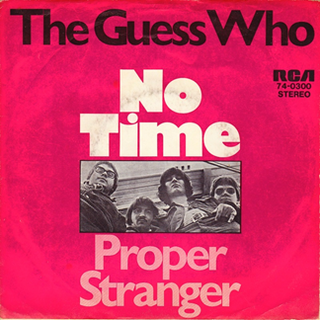
"No Time" is a song by Canadian rock band The Guess Who, composed by guitarist Randy Bachman and lead singer Burton Cummings.

"These Eyes" is a song by the Canadian rock band The Guess Who. The song was co-written by the group's lead guitarist Randy Bachman and lead singer Burton Cummings and originally included on the band's 1969 album Wheatfield Soul. It was first released as a single, in their native Canada, where its chart success (#7), along with the influence of CKLW-AM Windsor's radio station music director Rosalie Trombley, helped land them a U.S. distribution deal with RCA Records. It was subsequently released in the U.S. in March 1969, and became a breakthrough success for the group, as it would be their first single to reach the top ten on the Billboard Pop Singles chart, peaking at number six, and would eventually be certified gold by the RIAA for sales of over one million copies. It was also a top ten hit in South Africa. While it was actually the 18th single released by the band overall, it was the first from the line-up of Cummings, Bachman, Jim Kale, and Garry Peterson as produced by Jack Richardson.

So Long, Bannatyne is the eighth studio album by the Canadian rock band The Guess Who, released in 1971 by RCA Records.

"Have You Ever Seen the Rain" is a song by American rock band Creedence Clearwater Revival, written by John Fogerty and released as a single in 1971 from the album Pendulum (1970). The song charted highest in Canada, reaching number one on the RPM 100 national singles chart in March 1971. In the U.S., in the same year it peaked at number eight on the Billboard Hot 100 singles chart. On the Cash Box pop chart, it peaked at number three. In the UK, it reached number 36. It was the group's eighth gold-selling single. In March 2023, the song surpassed one billion streams on Spotify.

"Everybody's Talkin' (Echoes)" is a song written and recorded by American singer-songwriter Fred Neil in 1966 and released two years later. A version of the song performed by American singer-songwriter Harry Nilsson became a hit in 1969, reaching No. 6 on the Billboard Hot 100 chart and winning a Grammy Award after it was featured in the film Midnight Cowboy. The song, which describes the singer's desire to retreat from the harshness of the city to a more peaceful place and an easier life, is among the most famous works of both artists, and has been covered by many other notable performers.

"The Dean and I" is a song by the art rock/pop band 10cc, from their 1973 eponymous debut album, written by Lol Creme and Kevin Godley. The song was released as the fourth single from the album in August 1973 and peaked at #10 on the UK Singles Chart. The single reached the top of the Irish Singles Chart on 20 September 1973.

Gregory Leskiw is a Canadian guitarist best known for playing guitar with the Guess Who from 1970 to 1972.
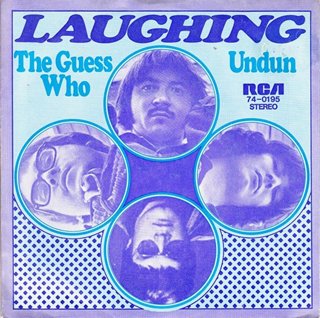
"Laughing" is a popular song by Canadian rock band The Guess Who. It peaked at #1 on the Canadian Singles Chart for a single week and at #10 on the United States' Billboard Hot 100, becoming the band's second single to reach the Top 10 on the latter. It became their second of three gold records in the United States and also made the Top 20 on singles charts in New Zealand and South Africa.

"Nothing Rhymed" is a song written and recorded by the Irish singer-songwriter Gilbert O'Sullivan. It was released in 1970.

"Share the Land" is a song written by Burton Cummings and performed by The Guess Who. It reached #2 in Canada, #10 on the Billboard Hot 100, and #63 in Australia in 1970. The song was also released in the United Kingdom as a single, but it did not chart. The song is featured on their 1970 album, Share the Land.

"Albert Flasher" is a song written by Burton Cummings and performed by Canadian rock band The Guess Who. Initially released as the B-side of their "Broken" single in 1971, it was promoted to A-side status in mid-May of that year, according to the Billboard Hot 100 chart. It did not appear on any of their studio albums at that time, although it would much later be included on reissues of the band's 1971 album So Long, Bannatyne. It would also appear on many of their later compilation albums, including the 1973 release The Best of The Guess Who Volume II and the 1973 compilation EP titled The Guess Who. It was also performed many times in concert, including the performance captured on Live at the Paramount (1972).
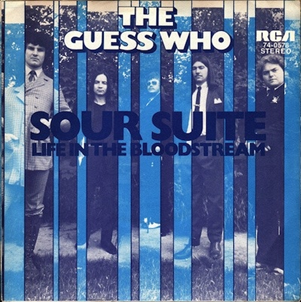
"Sour Suite" is a song written by Burton Cummings and performed by The Guess Who. It reached #12 in Canada and #50 on the Billboard Hot 100 in 1972. The song was featured on their 1971 album, So Long, Bannatyne. Cummings said it took between two and three days to write the song. Its lyric about being "back in 46201" refers to a zip code for Indianapolis. Cummings took it from the return address of a letter sent to him by a female fan.

The Best of The Guess Who Volume II is the fifth compilation album by the Canadian group The Guess Who. It was originally released by RCA Records in 1973, and contains recordings made between 1970 and 1973.
